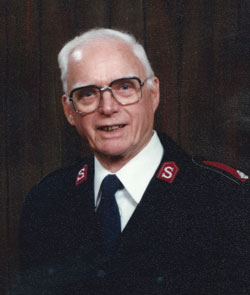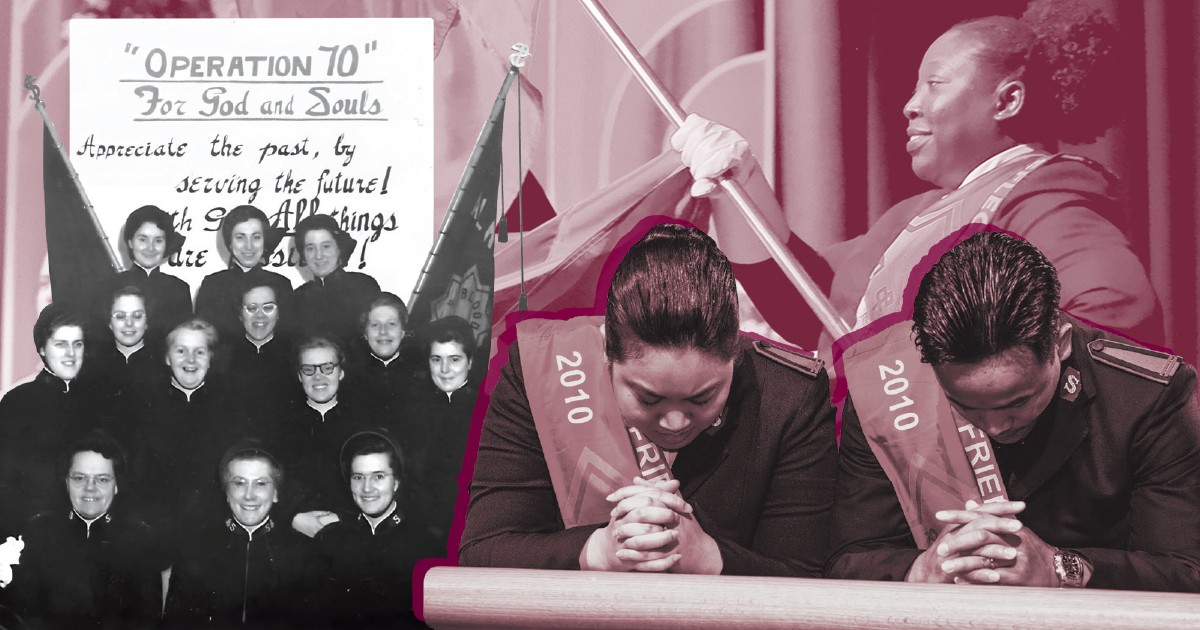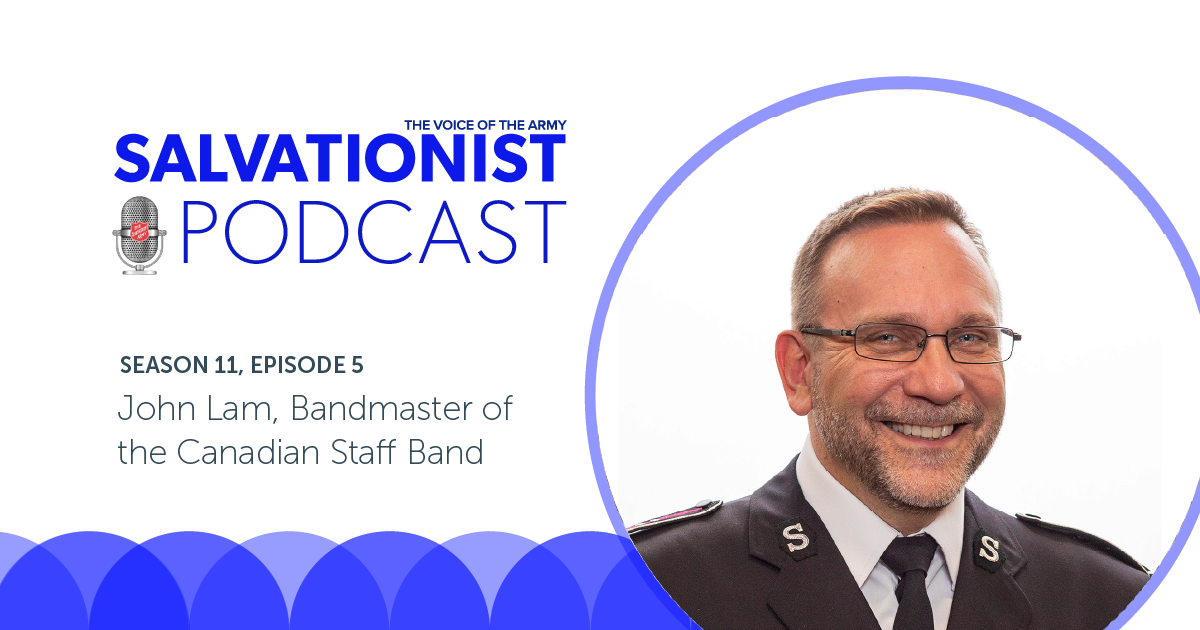 Colonel Ernest Fitch shares vivid recollections of the First World War and the Great Depression
Colonel Ernest Fitch shares vivid recollections of the First World War and the Great Depression
This July, Colonel Ernest Fitch will achieve a milestone. At the age of 107, he will have been retired for 42 years, as long a time as he was on active service.
“When I turned 100, I bumped into General John Gowans when he was visiting Canada and I introduced myself and told him my age. 'Oh!' he joked, 'Farewell these fellows who are trying to break the bank!'
“Imagine what he would think now!”
Testimony in Chalk
The eldest of seven children, Colonel Fitch was born in Vancouver.
“I used to joke that every time the doctor came to visit us with his black bag, he left a baby,” he recalls.
Colonel Fitch's mother was a housemaid for one of the wealthier families in the city until she married, while his father was a stable boss for a local dairy.
His most vivid recollection from a century ago dates from his school days.
“I used to walk to class with a pretty little six-year-old girl. We were at the corner of 33rd and Waldin when suddenly this monster roared down the street, clanging and whistling. Frightened, we scurried the remaining block to school. It was the first time we'd ever seen a horse-drawn fire engine!”
Colonel Fitch's father was a Methodist, and his mother, who came from England, was Anglican, “although from what I gather, they weren't working too hard at it,” he smiles.
But one evening, the two attended a service at the Army's Mount Pleasant Corps in Vancouver. Their souls were stirred enough to answer an altar call that very evening, and they became adherents. Colonel Fitch's father was eventually commissioned as a local officer, becoming a colour sergeant.
When the colonel was nine, a church service at the South Vancouver Corps profoundly changed his life.
“My dad and I were sitting together when it came time for the altar call,” he remembers. “The corps officer left the platform, came directly to me—I can still see him walking down the aisle—and said, 'Do you want to be good like your dad?' I replied, 'Yes.' And without a further word, he brought me to the altar and prayed with me.”
The experience must have been important for the young boy, because the next day, he took a piece of chalk and scrawled the following testimony on the side of their house: “Ernie Fitch got saved on March 17th, 1914.”
 Colonel Ernest Fitch in 1967
Colonel Ernest Fitch in 1967
Wartime Loss
With the First World War raging, Colonel Fitch's father volunteered to go overseas in 1916, leaving a pregnant wife with six children. Transferred to the 54th Brigade, he was killed at Amiens, France, in August 1918, as the war neared its end.
The death devastated the family, both emotionally and financially. Colonel Fitch's mother had to return to work, leaving his young sister, 11-year-old Winifred (who eventually became a brigadier in The Salvation Army), to look after the family. After completing his last year of public school, the 14-year-old worked various jobs, as a paper-boy, delivery man and office boy.
Colonel Fitch subsequently worked at the Royal Bank of Canada for 7½ years, first as a teller and then as a bookkeeper. By his 20s, the young man was quite happy being a Salvationist and working at the bank.
But in 1925, he and his future wife, Gladys, attended a Salvation Army service. That night, one of the officers sang, “By the peaceful shores of Galilee, mending their nets by the silvery sea, the fishermen toiled at their tasks each day.”
“I was all right until he got to the third verse: 'As the fishermen heard by Galilee: Leave now your nets and follow me,' ” says Colonel Fitch. “That knocked me for a loop. I couldn't get it out of my head.
“By Tuesday, I was miserable as sin,” he continues. “I just couldn't hold out anymore, so I went to the altar, and when I opened my eyes and looked around, my future wife was kneeling right beside me! It turns out she had wanted to be an officer, too, and had been waiting for me to make up my mind.”
A Full Life
The young couple attended training college and were married in 1928. Appointments across the territory followed.
“I still think of the officers who served through the Great Depression,” Colonel Fitch says. “One of the officers at Estevan, Sask., used to say that she would give the children their lunch and then go upstairs and pray because there was no lunch left for her. There was a camaraderie there. We were all in the same boat, but no one ever thought of resigning.”
Further postings followed after the Second World War, but his wife's failing eyesight necessitated him taking a job in the finance department at territorial headquarters.
“So what did they do with me? Made me a teller again,” he laughs.
Colonel Fitch officially retired on July 1, 1970.
“When Commissioner Wycliffe Booth retired, we had a party for him,” says Colonel Fitch, “and when it came time to shake hands with him, he poked me in the stomach and said, 'Well, Fitch, you did better than we expected.' So I guess I turned out all right!”
After his retirement, Colonel Fitch continued to work part-time as a bookkeeper until he turned 80, and then finally walked away from active duty. For the next several years, he and Gladys did as much travelling as they could, up and down the West Coast.
Eventually, their children arranged for them to live at an Army retirement facility, where they stayed until Gladys' promotion to Glory in 1996.
“I've always been so grateful she had her last days there,” says Colonel Fitch, “because there was a lot of fellowship and activities for her, even during her declining years.”
Colonel Fitch, then 92, was able to live independently until an attack of shingles laid him low, and he then entered Evergreen Care Centre, a seniors' residence in North Vancouver.
“I went through a very bad time then,” he says. “I call it, 'my soul's darkest hour.' There were two or three weeks that I can't recall. I had horrible dreams of being lost and alone, not knowing how to get home.”
With the help of his children and his corps officer, the colonel recovered and his faith was strengthened as a result.
“I've worked it out with the Lord,” he says. “I'm living for the day when the trumpet blows and they say, 'Come on, Fitch, you've been around too long.' I'm in no hurry, mind you!”










Comment
On Wednesday, December 26, 2012, Adelle Brown said:
Leave a Comment